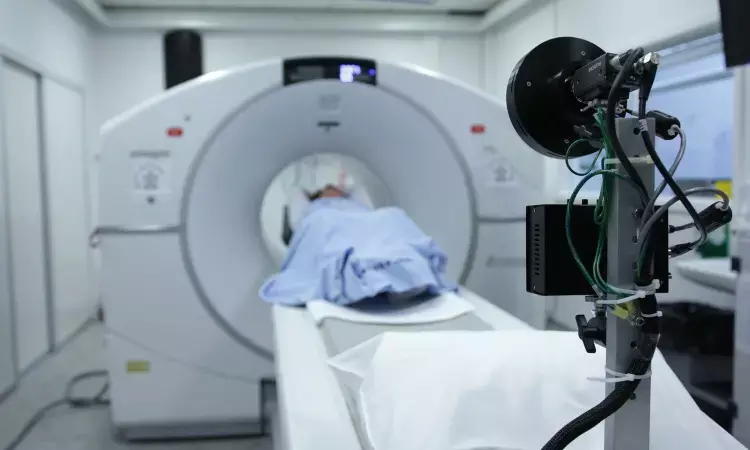- Home
- Medical news & Guidelines
- Anesthesiology
- Cardiology and CTVS
- Critical Care
- Dentistry
- Dermatology
- Diabetes and Endocrinology
- ENT
- Gastroenterology
- Medicine
- Nephrology
- Neurology
- Obstretics-Gynaecology
- Oncology
- Ophthalmology
- Orthopaedics
- Pediatrics-Neonatology
- Psychiatry
- Pulmonology
- Radiology
- Surgery
- Urology
- Laboratory Medicine
- Diet
- Nursing
- Paramedical
- Physiotherapy
- Health news
- Fact Check
- Bone Health Fact Check
- Brain Health Fact Check
- Cancer Related Fact Check
- Child Care Fact Check
- Dental and oral health fact check
- Diabetes and metabolic health fact check
- Diet and Nutrition Fact Check
- Eye and ENT Care Fact Check
- Fitness fact check
- Gut health fact check
- Heart health fact check
- Kidney health fact check
- Medical education fact check
- Men's health fact check
- Respiratory fact check
- Skin and hair care fact check
- Vaccine and Immunization fact check
- Women's health fact check
- AYUSH
- State News
- Andaman and Nicobar Islands
- Andhra Pradesh
- Arunachal Pradesh
- Assam
- Bihar
- Chandigarh
- Chattisgarh
- Dadra and Nagar Haveli
- Daman and Diu
- Delhi
- Goa
- Gujarat
- Haryana
- Himachal Pradesh
- Jammu & Kashmir
- Jharkhand
- Karnataka
- Kerala
- Ladakh
- Lakshadweep
- Madhya Pradesh
- Maharashtra
- Manipur
- Meghalaya
- Mizoram
- Nagaland
- Odisha
- Puducherry
- Punjab
- Rajasthan
- Sikkim
- Tamil Nadu
- Telangana
- Tripura
- Uttar Pradesh
- Uttrakhand
- West Bengal
- Medical Education
- Industry
Hyperbaric oxygen therapy effective for radiation cystitis in pelvic radiotherapy patients: Study

A comprehensive retrospective analysis that spanned over a decade shed light on the incidence, risk factors and management strategies associated with radiation cystitis in prostate cancer patients who undergo pelvic radiotherapy. The findings of the study were published in the Urology journal.
The study was conducted using the extensive PearlDiver™ Mariner database and examined the records of a total of 274,865 patients who received radiotherapy for prostate cancer from 2011 and 2022. The primary objective was to determine the overall incidence of radiation cystitis and analyze the factors that contribute to its development.
The results revealed that 17.7% of patients experienced hematuria following radiotherapy, while 2.8% were diagnosed with radiation cystitis. Among the patients diagnosed, approximately 30% underwent diagnostic or therapeutic endoscopic interventions. Only a small fraction of patients, about 0.76%, opted for endovascular embolization, while 1.95% required cystectomy. Hyperbaric oxygen therapy was found to be the most prevalent treatment option that was administered to 16.67% of patients, with a significant upward trend observed over the study period.
Further analysis utilizing multivariate logistic regression unveiled several significant risk factors associated with radiation cystitis. Obesity, smoking and diabetes were identified as significant contributors with odds ratios of 1.29, 1.27 and 1.32 respectively, all with p-values below 0.001. These findings underline the importance of addressing modifiable risk factors in the management and prevention of radiation-induced complications.
The findings of this study emphasized the clinical significance of radiation cystitis as a rare yet impactful complication following pelvic radiotherapy for prostate cancer. Despite advancements in treatment modalities, the incidence of radiation cystitis remained stable throughout the study period which highlighted the need for continued research and innovative approaches to reduce its occurrence and improved patient outcomes.
The comprehensive approach of the study provides valuable insights for clinicians in risk assessment, treatment selection and patient counseling. Clinicians can tailor interventions to individual patient profiles, optimizing therapeutic efficacy and minimizing adverse effects by identifying key risk factors and evaluating management strategies. The integration of these findings into clinical practice holds the potential to enhance the overall quality of care for prostate cancer patients undergoing radiotherapy by ultimately enhancing treatment outcomes and patient well-being.
Source:
Bologna, E., Licari, L. C., Franco, A., Ditonno, F., Manfredi, C., De Nunzio, C., Antonelli, A., De Sio, M., Coogan, C., Vourganti, S., Leonardo, C., Simone, G., & Autorino, R. (2024). Incidence and Management of Radiation Cystitis After Pelvic Radiotherapy for Prostate Cancer: Analysis from a National Database. In Urology. Elsevier BV. https://doi.org/10.1016/j.urology.2024.04.035
Neuroscience Masters graduate
Jacinthlyn Sylvia, a Neuroscience Master's graduate from Chennai has worked extensively in deciphering the neurobiology of cognition and motor control in aging. She also has spread-out exposure to Neurosurgery from her Bachelor’s. She is currently involved in active Neuro-Oncology research. She is an upcoming neuroscientist with a fiery passion for writing. Her news cover at Medical Dialogues feature recent discoveries and updates from the healthcare and biomedical research fields. She can be reached at editorial@medicaldialogues.in
Dr Kamal Kant Kohli-MBBS, DTCD- a chest specialist with more than 30 years of practice and a flair for writing clinical articles, Dr Kamal Kant Kohli joined Medical Dialogues as a Chief Editor of Medical News. Besides writing articles, as an editor, he proofreads and verifies all the medical content published on Medical Dialogues including those coming from journals, studies,medical conferences,guidelines etc. Email: drkohli@medicaldialogues.in. Contact no. 011-43720751


